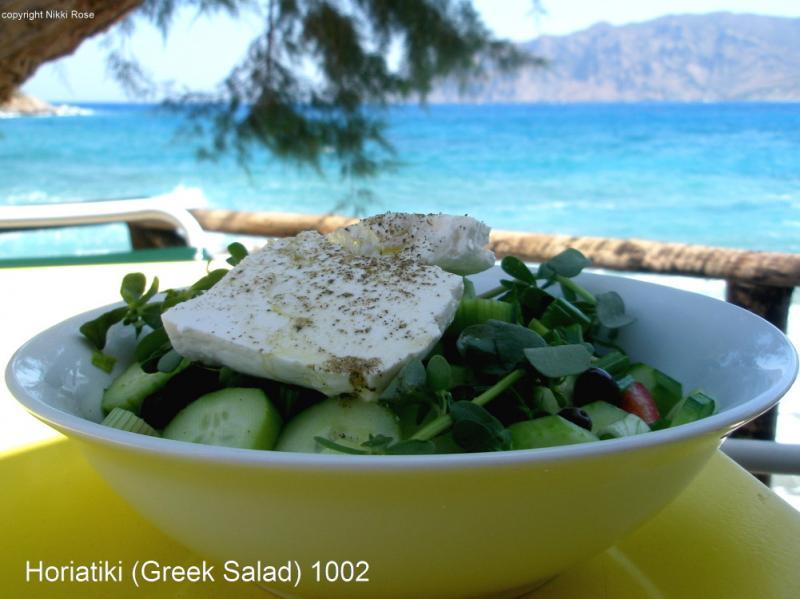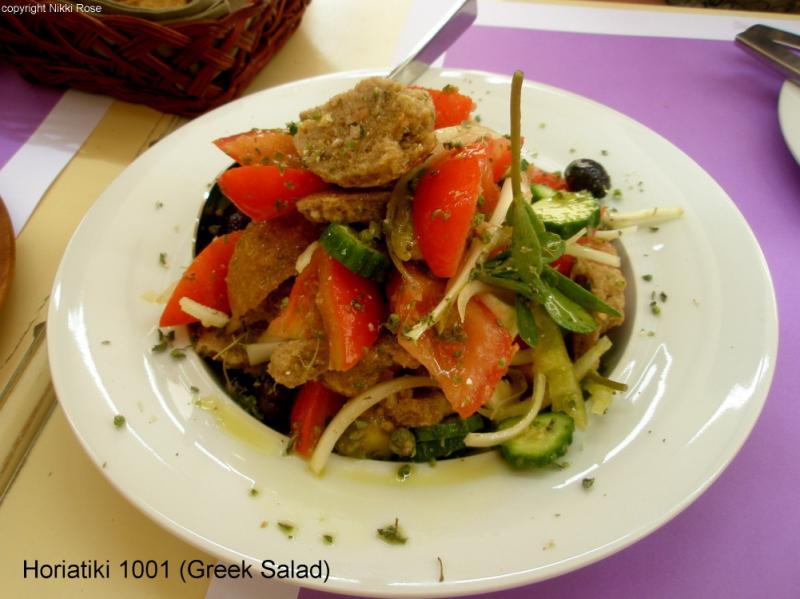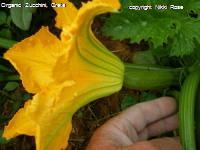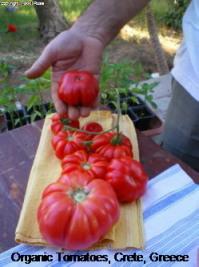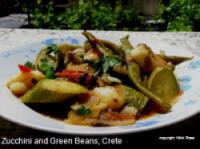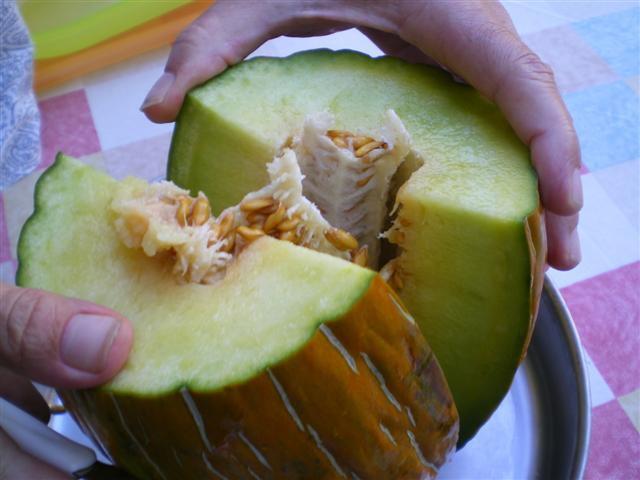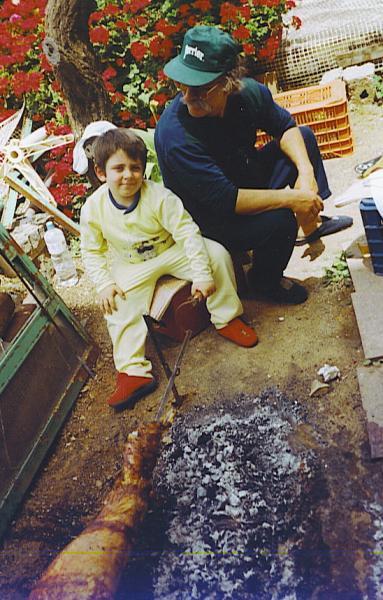
Nikki Rose
participating member-
Posts
24 -
Joined
-
Last visited
Content Type
Profiles
Forums
Store
Help Articles
Everything posted by Nikki Rose
-
Greetings, If you are in Washington DC on October 20, we'd be delighted if you would join us! Nikki Rose, a Greek American Professional Chef and Writer, and founder of the award-winning Crete's Culinary Sanctuaries Eco-Agritourism Network will be speaking about her work and book at the Embassy of Greece. http://www.cookingincrete.com/Nikki-Rose-Book-Presentation-Crete-The-Roots-of-the-Mediterranean-Diet.html Nikki Rose Founder & Director Crete’s Culinary Sanctuaries Network Educational programs celebrating Crete’s cultural and natural heritage, sustainable organic agriculture and traditional cuisine www.cookingincrete.com Host Note: Click here for the terms under which this event is listed in eG Forums.
-
I forgot to mention how disheartening it was to read this bit in the article: "With some of these dishes, shortcuts are virtually impossible: If you want to make real croissants, you start with real puff pastry." Ugh.
-
I figure there's only one way to preserve lemons. That's not a treat I'd want to expedite -- producing inferior results. That would be a pointless effort to me and a waste of lemons. And I wouldn't dare share them with my neighbors, especially here in Crete where preserving fruits is a great art. If I crave food that requires more than a flash-in-the-pan minute of my attention, I'm make the time to prepare it properly. If that's considered "old school" or "the arduous way," well that's just the way it is. Let's leave the brainwashing fast-food marketers out of this. So to each his/her own. Cook/eat the way you want to. If you love the results, that's what counts.
-
Authentic...defined by whom? As a Greek American now living in Crete, I see both sides of this issue. When people move away from their homeland, they hang onto their culinary traditions, which is very important. They refer to their family recipes as authentic. Indeed they are. We want that spinach pie we love and we don't want any variations. That's a challenge for anyone but the originator of our "authentic" family recipes. But the people still living in their homeland are just as bored with replicating exact recipes as anyone else. So what is considered authentic Greek spinach pie by one Chicago-based taverna owner or resident is going to be vastly different in every home, village and city in Greece. But it is still authentic to the creators. Consider the "Greek Salad." A writer from the US dined in a Greek taverna in Chicago. She described the contents of her Greek Salad and asked me to confirm if it was authentic. Well, let's consider this: When you are in Greece, do you think the Greeks order a "Greek salad"? No, they order a horiatiki (village salad). The main components are tomatoes and cucumbers but the rest of the salad contains whatever is ready to harvest in that particular region (or taverna owner's garden out back). Unless they place an imported sardine on top, a horiatiki is still local and authentic. But only if it is served during the summer months when these basic ingredients are, in fact, fresh and local from the horio (village). So does authenticity matter? Perhaps to some. Respect for local sustainable organic farmers, local ingredients and taste matters more to me. Without the first two, the latter is hard to find. Kali Orexi, Nikki Nikki Rose Founder & Director Crete's Culinary Sanctuaries
-
Conventionally grown tomatoes in the USA top the list. Even during the height of the season, they taste like zip. The only solution is farmers' markets if at all possible (and supporting those farmers). When I first moved to Crete and my organic farmer-friends gave me loads of tomatoes, zucchini and green beans, I was so surprised that they had flavor! I had forgotten what they are supposed to taste like. And they are from the New World! It's very unfortunate. Heirloom seeds-varieties are hard to come by in the US today. Tragic...for many reasons. One more unappetizing tidbit is the pesticide levels. For info on that pesky issue, see the Environmental Working Group's Shopper's Guide. When in doubt, try wine (for the cook and the sauce)!
-
I have moved for food...more than once. And I am on a continuous journey in search of good food producers - farmers, bakers, beekeepers, fishers, chefs...the whole good food chain. I have never been rich (usually closer to the opposite) but if I have a kitchen full of good organic olive oil, fresh produce from my wonderful friends and neighbors and wild oregano, I feel very rich indeed. Good food is a major priority for me (I'm not talking about fancy food, just a tomato or cucumber with flavor makes my day). So I've determined over the years that it's best for me to live closer to my favorite food sources, whenever possible.
-
Easter in Crete, Greece by Nikki Rose I dreamed of spending Pascha, or Easter, in my family's homeland and it was not until I moved to Crete that I had the chance. The week before the big day, my partner, Panayiotis, and his friends made arrangements to gather the ingredients needed for a series of feasts - after presumably fasting according to church doctrine, during the 40-day Lenten period. First, we had to buy a whole lamb, which entailed a long wait at the kafeneo on the village square, anticipating the signal. After a few coffees and sips of raki, a grape-must fire water, the shepherd's young son, Nektarios, drove by in his pickup truck and yelled, "Ela, pah-me!" (Hurry! Let's go). We dashed to our car and followed Nektarios up the winding coastal mountain road that led to a treacherous dirt track before we abruptly stopped at the edge of a clearing. We continued our adventure on foot to the mitato, or shepherd's shelter, a round stone structure with smoke billowing out of its chimney. The commanding summit of Mount Oxa loomed above the plateau bursting with yellow, red and purple wild flowers and herbs. A flock of sheep grazed nearby, their bells ringing like a sweet lullaby. There was whistling and movement on Oxa's steep ridge as goats were being called home by their keeper, so far away they looked like black and white dots. Manolis and his family were inside the mitato, hovering over a caldron of sheep's milk, which was slowly transforming into malakos, or cheese curd, straight from the source. We sat squeezed around his small table and sampled meze of dried dakos, the local whole-grain bread softened with olive oil and seasoned with oregano, along with tiny, nutty olives and mountain snails steamed in olive oil, rosemary and homemade rosé wine. Numerous toasts with Manolis' famously smooth raki were made. After an hour of socializing in which Manolis covered the topics of shepherding, cheese making and the serious dilemma of vanishing grazing land, its protection left in the hands of developers who envision more hotel complexes and wider roadways, we set off to choose the highlight of our Easter dinner. After much inspection and discussion, we decided on the perfect lamb and made arrangements to pick the little dear up on Friday. As a long-time city dweller, this type of food shopping did have an effect on my former connections, or lack thereof, with the food that I eat. It's perfectly logical and beneficial to know your food sources, and it's a privilege to meet the people who provide them. This healthy little lamb had been living in the mountains grazing on wild plants. Expressing my thoughts on how, in my concrete world, we rarely meet the animals we eat or the people who tend to them would have been ridiculous to these farmers who make it a point to nurture their food sources. But even Panayiotis said, "Next year, we'll let Dimitris shop for the lamb." Pascha also symbolizes the celebration of spring and appreciation of our resources - food and water. Brilliant red poppies, the Pascha flower symbolizing the blood of Christ, blanket the hillsides. Wild vegetables and herbs, along with the first cultivated crops spring to life after a dormant winter. Livestock deliver their offspring. Unlike modern urban meal planning, where you can get anything you want whenever you want, barring freshly harvested quality, Pascha in Crete still stands for seasonal fare. Easter mass begins at about 10pm on Saturday. Midnight symbolizes the resurrection of Christ, when the priest lights the sacred candle and shares the fire with the congregation. Slowly, the church reflects brilliant warmth while devotees chant, "Christos Anesti" (Christ has risen) 40 times. The Lenten period carries into culinary tradition. Hard-boiled eggs, dyed deep red to symbolize the blood of Christ, are atop sweet yeast breads and are used in a contest for good luck. Participants tap both tips of their opponent's eggs and the winner emerges with an uncracked shell. After mass, the priests and congregation flooded the square to greet villagers and share the sacred light with those who could not fit into the church. If you can keep the candles alight until you get home, you'll have good luck. What freaked me out was the fireworks exploding all around me. Pascha in the U.S. is definitely more conservative. The crowd disappeared into the narrow streets for their feasts. For those who follow tradition in the kitchen, Mayeritsa soup, lamb's head and/or innards braised in an aromatic broth, is made on Saturday afternoon. Others may concoct variations or koukoretsi, which is a delicious, gigantic lamb sausage grilled over the outdoor spit. After a few hours of sleep, we were expected at Dimitris' house for the Sunday afternoon grand celebration of arni, or lamb on the spit. In the corner of his yard, Dimitris set up two stones to secure iron braces that bordered a makeshift pyre of charcoal, pruned olive branches and grape vines. The lamb is skewered with what resembles an old sword, the ancient tradition of spit-style cooking for nomadic shepherds or freedom fighters. No fancy machinery is required. Dimitris' pyre-post consisted of two beer crates - one to sit on and another to hold his food and wine while he slowly turned the spit. Estimated cooking time was six hours. We sat a comfortable distance away from the fire, eating meze and drinking homemade wine. Dimitris bravely broke off bits of crispy-hot layers of arni and passed them around. Dimitris' wife, Maria, is an expert in vegetable preparation, using a single sharp paring knife and two bowls. She skillfully whipped through a kilo of potatoes in less than five minutes and placed them into a pan of smoldering green olive oil. No cutting boards or food processors in sight. While the men were outside, deeply involved in the traditional symposium of whether the lamb was done or not, Maria removed her hortapita, the wild greens version of spinach pie, and galatoboreko, a farina-based rich custard layered between phyllo, from the oven. The first time I indulged on Maria's hortapita, I asked her where she got the scrumptious, thick phyllo dough. She went into the kitchen and returned with a rolling pin and waved it over my head. To make enough phyllo for one pita is hard labor, rolling dozens of tough, small rounds of dough into thin sheets. Finishing touches to our feast were two bowls filled with gorgeous tomatoes, cucumbers, spring onions and wild oregano, along with randomly placed chunks of feta and mizithra cheese. Bread and breadcrumbs were already everywhere. Plastic soda bottles containing homemade wine - Greek recycling at its best - were placed on each corner of the table. After warning the crowd to step aside, Dimitris and his son Makis, carefully picked up the molten skewer holding the lamb and propped it upright against the wall. There was some discussion as to how to proceed, as Makis is now a chef at one of the big resort hotels, and Dimitris has just been doing this all of his life. Eventually, they carved the lamb as they always have. Dining the Greek way is at least a three-hour experience, and during holidays or festivals it could last for several days. The grandchildren were finished with their feast and begging to turn off our beautiful regional Pascha music, so that they could watch cartoons. It was a typical day in the life of my friends who juggle tradition and tolerate modern. Round midnight, filled with food, wine, life and love, we made our way home. The difference between Pascha in Greece and Easter in America? The opportunity to shop for organic lamb, eat Maria's homemade phyllo and pretend to enjoy the fireworks. © Nikki Rose 2005, All Rights Reserved.
-
After many years of cooking together, my family has a way of coaxing each other into making particular dishes that one of us has perfected to unanimous votes of "this holiday would not be the same without your [fill in the blanks]." I don't have much of a sweet tooth any more after working as a pastry chef for many years. I'd rather just braise some lamb shanks and serve a salad and oranges for dessert and call it a night. However, my family looks at me and sees "pastries" written on my forehead. I make baklava for this reason, which I made long before I went to cooking school (about age 10 with phyllo dough flying everywhere I imagine). I've tweaked the recipe over the years to make it good for all of us. No sugar. Double the roasted walnuts and almonds in any average recipe. Spiced honey syrup laced with a good shot of Metaxa. That works for me. It also works really well for breakfast with yogurt and dried fruits. Kind of like a Greek granola. It sure beats that sugar-laced cereal the children eat...for my tastes. My personal favorite that is also a big hit is galaktoboureko (a luscious custard and phyllo pie). I'll dig up that recipe when I have more time...it's nearly 11pm here in Crete. Kali Orexi! Nikki
-
There is a lot more to this issue than most mainstream international press has covered thus far. This has everything to do with the consequences of unsustainable development-tourism. Some communities are learning by their own mistakes or the mistakes of others and attempting to curb the destruction of their cultural-natural heritage before it's too late. Unfortunately, it is too late for many communities across the globe. Granted, the public authorities in this particular case may not be handling this as best as they could. This could be due to lack of training in implementing sustainable tourism programs and conveying the reasons for these crucial decisions. But they are responding to their citizens' requests. People who do not live in Lucca and are not informed of the whole situation are in no position to offer suggestions or opinions on this matter. Unfortunately, many have already (with a very pro-globalization stance) and they might be the first to complain that they cannot find gelato in Italy any more. Cultural-natural heritage preservation is crucial in many places around the world (including Italy) where a large percentage of the population is involved in artisan food production and tourism to support themselves. Last I checked, 1 in 9 citizens of Italy are employed in the tourism industry. That does not include the many businesses that rely almost solely on tourism to make a living. If they wait until their regions are paved over by natural-resource-sucking generic resort hotels and their historic sites are obstructed by KFC billboards and McD arches, it's too late. Once communities allow globalization to wipe out the very thing that makes them distinctive, they risk becoming prisoners in their own *popular destination* which will no longer be livable or enticing to visitors. People need to be much more aware of the consequences of their travel choices, expectations and uninformed opinions of *foreign lifestyles.* Otherwise, they should simply visit Vegas or Orlando and let the rest of the world population live as they choose. For info on sustainable/responsible tourism, see for starters: Sustainable Travel International, ECOCLUB.com, National Geographic Adventure's Blog entitled *Beyond Green Travel.*
-
This is an interesting question. Who defines salad? What happens to the salad when it is *exported.* For instance, Greek salad. Of course, when you are in Greece, you will not hear the Greeks ordering such a salad. It is simply called *horiatiki.* Horio means village. You'll enjoy whatever is ready to harvest in the local gardens. In this case, a more accurate translation might be *summer salad* because the core ingredients are fresh tomatoes, cucumbers and peppers. Depending on where you are and what time of year it is, there are some tried and true flavor/texture combinations. Horiatiki is part of a long list. While you can replicate this across the globe at any point in time with flavorless out-of-season imports, you would not be able to enjoy a Greek salad in a Greek village once the growing season has ended. Eating fresh and local is the only option for many people around the world...which can be an advantage. Most likely, at some point, someone passing through claimed a particular combination of local ingredients was *authentic* or *classic* and the rest is history with plenty of marketing mania. However, if you are in the mountains of Crete in August and your hosts have run out of onions, they can still serve a horiatiki without concern for wandering self-proclaimed authenticity experts. Also, they will not be serving olives from Kalamata or a *dressing* of chemicals from a USA laboratory. Since the Greek salad concept was successfully exported, it can now mean most anything to any one. I don't know how iceberg lettuce ended up in exported varieties...I've never seen the tasteless stuff growing in a villager's garden. We grow a lot of Kos (Romaine). Fresh greens (both cultivated and wild) are normally served on their own in a variety of ways that let their texture and flavor shine, instead of being overpowered and weighed down by horiatiki ingredients. It's just the way it is. Ironically, because *Greek salad* has become so famous outside of the country, Greek taverna owners working near mass tourism areas attempt to keep an ample supply of anticipated ingredients on hand for visitors. Call it the classic boomerang.
-
With regard to this WSJ article about Parmigiano Cheese Makers Hard Times for Parmigiano Makers Have Italy Ponying Up the Cheddar Government Tries a Bailout, 'Just as There Was for Banks,' to Help Struggling Producers, December 11, 2008 http://online.wsj.com/article/SB1228775653...icle-outset-box Alas, buying more cheese will not help the cheese makers in this case and many others that are sure to follow. Unfortunately, this simplistic purchase (bailout?) by the Italian government (using EU funds) is not fixing the problem. The problem lies in the distribution chain. This article did not mention what profits everyone else in this food chain makes. This is a catch-22 for all artisan food producers. If you look at how the system works, most everyone else in the food chain makes decent, even tremendous profits: the distributors, exporters and retailers that demand rock-bottom prices from producers. It's amazing that there are any artisan products at the market, based on the *standard* system where producers benefit the least. New approaches like Francesco Salvini's (mentioned in this article) will hopefully help. But the root of the problem is still unsolved. Several small-scale organic producers in Crete are doing similar things but it's an uphill battle, particularly since gov't support of their work is very minimal or nonexistent. Tangible support for farmers-artisan producers around the world should be increasing, especially in the case of sustainable organic products. All of the stakeholders need to be a part of the solution...unless they really don't care if wonderful Parmigiano or Feta or Brie simply disappears from the markets. Nikki Rose Founder & Director, Crete's Culinary Sanctuaries Eco-Agritourism Network
-
Looking for a Greek marinade for Lamb Kabobs
Nikki Rose replied to a topic in Elsewhere in Europe: Cooking & Baking
Cumin, vinegar and lemon juice might have been used in the food court's recipe. Here in Crete, Greece, I haven't seen complicated marinating at all in the case of souflaki. A little olive oil, salt, pepper, oregano, possibly cumin and on the grill it goes. We sprinkle oregano and lemon juice on the souflaki after it's cooked. There are certainly regional differences...Cretan cooking can be simple, depending on the village and the ingredients. With lamb, it tends to be very simple. -
Having lived in rural Crete for over 10 years now, this is an interesting view of *food sourcing.* 100 percent of the people I know must raise and/or collect most of their food. As a former city dweller myself, the first time I spent a week in shepherd's country, I was taken aback. But I had to get a grip...the slaughter of lamb is a part of life...for those who choose to enjoy it for dinner. A shepherd and his/her family does not have a choice in the matter. Granted, the younger generation is moving out of rural areas and might feel just as leery about *direct food sourcing* let's say, than a Bostonian might. Still, they acknowledge the facts of life in a more realistic way and are very suspicious of foods that were not produced or collected by someone they know. It's food safety common sense.
-
Georgia Organics, a non-profit, has a list of resources, training programs, links to extension programs, etc. http://www.georgiaorganics.org/about_us All the best, Nikki
-
Dear JGreen, Sorry for my delay in responding to your question. I guess you have been to Crete and back already! I work in Crete on eco-agritourism programs, so am always looking for the best places to visit and eat naturally. Crete is a big island, so I'd love to hear about your culinary journeys. October is the raki making season, as others have mentioned. It is also called tsikoudia in Crete and tsiporo in northern of Greece. Raki is actually the Turkish word for the spirit, which is widely used here, considering Crete's history. There are variations of raki throughout the Mediterranean basin. It's called Arak in Iraq. It is distilled from grape must and is called grappa in Italy. The raki, tsiporo or grappa available for international sale is twice distilled and usually stronger. In Crete, village distilling equipment varies to a great degree...but it's a very basic system. Wood burning fire under a caldron that leads to the distilling tank with a spout at the base where the spirit trickles out very slowly. It is rarely flavored, although raki can be made with honey and other fruits...grape must is the standard. Most villages have a factory for raki making and locals bring their grape must to the local distiller or best one in the region. So it is always a long wait and a social occasion. It can be very smooth and terrific or give you an instant headache. It is not made in the moonshine way, it is actually legal and used for medicinal purposes as well, insect repellant...you name it. People take their raki very seriously and it is not something to overdo. It is served in a small carafe with small shot glasses just to remind you of that fact. We don't always heed that warning, of course. Ouzo, which is flavored with anise is a much sweeter, more refined spirit. We don't make it in the village distilleries here in Crete. There is a lot of food that is traditionally enjoyed with raki. In fact, it seems most all food goes well with raki! Cold meze is the norm, not hot food. Pomegranates, pears, walnuts, cheese, olives. Drink enough of it and all becomes a watercolor blurr! Raki is a standard welcome drink and standard treat with the check when you are dining out. The olive harvest does not normally begin until the heavy rains begin in November. But we had plenty of rain in October and many farmers began the harvest early. Perhaps you had a chance to enjoy that experience as well. There are quite a few sustainable organic olive growers in the prefecture of Hania...and we hope there will be more soon! The grape harvest and wine making season is late August and September. All seasons revolve around the harvest and production of Crete's primary crops, so there's always activities, music festivals to enjoy during these times. I wrote an article about raki making in Crete way back when called "Fall in Fourni" the link is here: http://www.cookingincrete.com/Articles-Fourni.html Enjoy your culinary journeys! Nikki
-
About an hour drive from Mount Desert Island (30 minutes from Ellsworth) is the beautiful Downeast village of Buck's Harbor in South Brooksville. This is real off-the-beaten track coastal Maine. At the Buck's Harbor Market, you will find Rendezvous Restaurant - a word of mouth place that is one of the best restaurants on the Maine coast. The focus is Maine meets Mediterranean cuisine with local and organic products, including fresh seafood. Highly recommended. The telephone is 207-326-8531. Nikki
-
Wow, the zucchini blossoms are beautiful! They are great stuffed...and just raw in a salad. I've got a couple of food photos and summertime recipes on my website at www.cookingincrete.com. There's always more to add...every day! Happy cooking! Nikki
-
Potato Soup with Mushrooms and Greens ( RG2093 )


